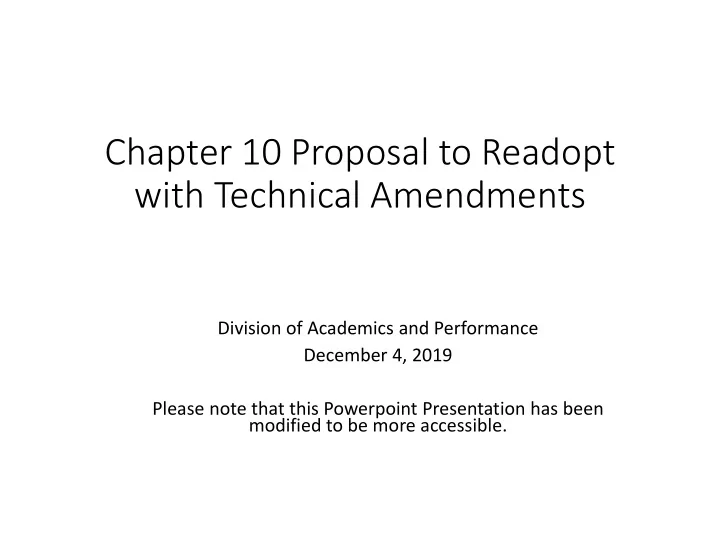

Chapter 10 Proposal to Readopt with Technical Amendments Division of Academics and Performance December 4, 2019 Please note that this Powerpoint Presentation has been modified to be more accessible.
The TeachNJ Act • The TeachNJ Act was unanimously approved by the legislature and signed into law on August 6, 2012 • Two-year pilot ensued with close to 40 districts throughout the state • Work was funded through the “Race to the Top” grant • Statewide implementation began in SY 13-14 • Achieve New Jersey Advisory Committee (ANJAC) convened for the first three years of the law’s implementation • District Evaluation Advisory Committees (DEAC) oversaw implementation locally
The TeachNJ Act: Major Impacts Prior to the TeachNJ Act After the TeachNJ Act Binary measurement rating teachers as Four-tiered measurement with greater satisfactory or not ability to differentiate levels of effectiveness Based on a single measurement of Based on multiple measures of student educator practice achievement and educator practice Multiple observations required only for Multiple observations required for all nontenured teachers teachers Overall limited ability to evaluate Greater ability to inform growth, effectiveness and growth requiring aligned professional development to evaluations
Chapter 10: Educator Effectiveness • AchieveNJ provides a more accurate picture of educator performance • AchieveNJ uses that data for professional development of individual educators as well as school- and district-level professional development activities
AchieveNJ: Teacher Evaluation2 of 2) Non-Tested Grades and Subjects Tested Grades and Subjects Teachers Outside of Grades 4 to 8, Teachers in Grades 4 to 8, Language Arts Language Arts Literacy and 4 to 7 Mathematics Literacy and Grades 4 to 7, Mathematics mSGP 5% SGOs, 15% SGOs 25% Teacher Teacher Practice, Practice 85% 70%
AchieveNJ: Principal, AP & VP Evaluation non-mSGP Principals/APs/VPs mSGP Principals/APs/VPs Administrator SGO Administrator SGO Goals, 10% Average, Goals, 10% Average, 10% 10% mSGP, 10% Principal Practice, Principal 70% Practice, 80%
2016 Amendments Targeted Area Objective Use accurate evaluations to inform quality Teacher Evaluation professional development Reframe observations and align components to Principal Evaluation strengthen school leadership Highly Effective Elevate, support and retain the best teachers to Teachers strengthen the educational community Streamline required evaluation timelines, Evaluation Processes processes and procedures to encourage greater and Procedures alignment and flexibility
AchieveNJ Current Status 1. Districts across the state have taken advantage of the flexibility in driving quality in their districts 2. Expectations for quality teaching and school leadership actions have been clarified 3. The observation process allows for improved conversations and feedback 4. Student, teacher and school leader data is being used to improve teacher and school leader practice
Chapter 10: Proposal to Readopt with Technical Amendments • The Department proposes to readopt the chapter with minor amendments to ensure the rules do not expire. • The Department also plans to initiate a future rulemaking that takes into account: • the comments received during the readoption process and • feedback from future stakeholder engagement.
Proposed Amendments Incorporate domains of practice and/or performance criteria that align to the 2015 Professional Standards for Educational Leaders(PSEL) developed by N.J.A.C. 6A:10-7.3(a)1 the National Policy Board for Principal practice Educational Administration (NPBEA) instrument N.J.A.C. 6A:9-3.4 defines PSEL as the professional standards for school leaders in New Jersey
Proposed Amendments (cont’d) Evaluation rubrics shall be submitted to the Commissioner by August 1 for approval by August 15 of each year. N.J.A.C. 6A:10-2.1(c) Aligns with the annual evaluation Evaluation of teaching survey submission timeline staff members Aligns with the Evaluation Instrument Request for Qualifications submission date
Recommend
More recommend